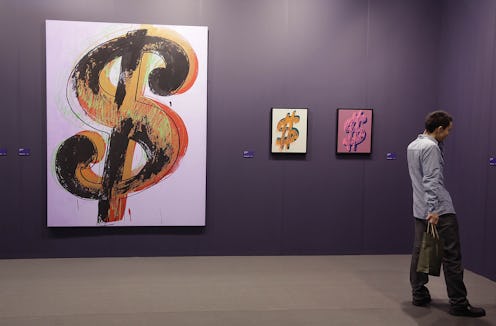News
85 People Are As Wealthy As Poorest Half Of World
Try picturing 85 people — enough to make a subway car pretty uncomfortable, but not a huge crowd. Well, according to an Oxfam report out Monday, the 85 richest people on the planet have the same amount of money as the poorer half of the world. According to the report, the 85 richest humans share a combined wealth of $1.6 trillion, which is about as wealthy as the poorest 3.5 billion of the world's population. The wealthiest 1 percent of the world own roughly $110 trillion, which is 65 times as much as the poorest half of the world's population.
"It is staggering that in the 21st century, half of the world's population — that's three and a half billion people — own no more than a tiny elite whose numbers could all fit comfortably on a double-decker bus," says Oxfam chief executive Winnie Byanyima.
So how did the financial crisis affect those numbers? Well, it turns out that the richest one percent of America got its hands on 95 percent of all the monetary growth since 2009. The bottom 90 percent, of course, became poorer.
Somewhat unsurprisingly, a recent Oxfam poll examining low-income earners in the U.S. showed that 65 percent of Americans believe that Congress passes laws aimed at benefiting the rich.
"We cannot hope to win the fight against poverty without tackling inequality. Widening inequality is creating a vicious circle where wealth and power are increasingly concentrated in the hands of a few, leaving the rest of us to fight over crumbs from the top table," Byanyima adds.
Oxfam claims that the jaw-dropping rise in inequality — seven out of 10 people live in countries where economic inequality has only increased over the last 30 years — has come about because of a "power grab" by the those wealthy few. The report argues that the super-rich have used their sway to skew government policies to their advantage: Since the end of the 1970s, tax rates for the world's wealthiest have actually decreased in 29 of the 30 countries the group was able to analyze.
The group also warned that economic inequality can exacerbate other problems, like gender inequality. That corroborates recent numbers released by the Shriver report: Today, over a third of Americans are either living in, or on the brink of, economic distress, and almost half of those are women. Other research has shown how women face the brunt of economic inequality on a global scale — they make up half of the world’s total population while representing a jaw-dropping 70 percent of the world’s poor.
Even though women produce half of the world’s food, and work two-thirds of the world’s working hours, they make less than 10 percent of the world’s income. In fact, less than one percent of the world’s property is owned by women.
And the likelihood of women getting the representation they deserve, on the economic front, isn't very high. This week, political leaders and top business people are convening at the World Economic Forum in Davos to discuss the global economy in between hitting the slopes — but the number of female delegates who attend the forum has dropped from 17 percent in 2013 to 15 percent this year.
In the U.S., President Obama has made it clear that closing the rich-poor gap is a priority, even calling it “the defining challenge of our time.” If Oxfam's report is accurate —and intuitively, I'm inclined to believe it is — his biggest hurdle will be overcoming the hefty power held by the country's richest.
But with four out of five Americans experiencing unemployment, near-poverty, or reliance on federal welfare at some period in their lives, you can bet your ass that fight will be worth it.
